
Archives? Right Here…And The Way Way Back Archives Are Here
I’m awesome. I wrote a book. It’s got little to do with movies. Download and read “Thank You, Goodnight” right HERE for free.
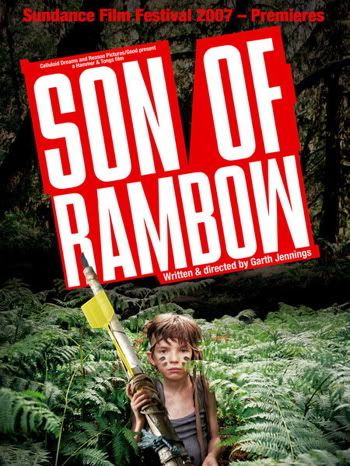 It’s easy to by cynical about films nowadays.
It’s easy to by cynical about films nowadays.
There is a lot of talk about the excesses and bloated nature of some high-budget spectacles, costs spiraling out of control to try and outdo what the last guy did. To say nothing of stories that seem purposely manipulative and out of touch with any reality.
That’s what makes SON OF RAMBOW so disarming. When you watch the film unfold you’re half-expecting there to be some kind of spectacle but it never does come. You have to steep yourself in a narrative where it genuinely is all about the story and the soft nuances that pepper each moment we’re given into the lives of these two young boys on a quest to recreate RAMBO: FIRST BLOOD.
At first glance, even if you read the movie’s description, you wouldn’t expect to find one of the most well-crafted movies this year but the movie is one which will reward each and every viewer if you believe that is possible to make a movie that is both humorous and touching without straying into saccharine sweet territory. The movie that Garth Jennings has made is one that takes the lives of young boys and, without minimizing or patronizing the childhood experience, he has distilled one of the most objective and endearing portraits of what it’s like to be young. Further, the movie works on a level where it’s not constrained by the normal boundaries of culture; it may take place across the pond but the story has a transcendent resonance that it doesn’t matter if it was taking place in England, France, Russia or America.
I took some of the time with 1/2 of Hammer and Tongs, Mr. Garth Jennings, to talk about the film, the language of youth and about who else has made videos as a kid.
SON OF RAMBOW is now in theaters.
CHRISTOPHER STIPP: Garth. How are you doing?
GARTH JENNINGS: Pretty good – my first cup of tea has just arrived so I’m feeling pretty excited about it.
CS: Thank you for making time for me.
JENNINGS: No problem. It’s my pleasure.
CS: First of all, brilliant, brilliant film. One of the best I’ve seen this year.
JENNINGS: Oh, thank you very much. That’s very kind of you.
CS: Absolutely. I think after I saw it I was wrestling with what I like most and I think the way to kick things off is to ask was it intentional to give these kids sort of a language of their own? They exist in a place that adults just don’t live in.
JENNINGS: Well, I suppose I remember being a kid and you just have this language with one another. You have your own little way of doing things and saying things. It was certainly our intention to capture how we remember being kids. We really tried to find memories of that time. We used to make strange faces and that sort of thing. Is that what you meant?
CS: Yes, I think it’s like a sensibility, maybe I should say it that way.
JENNINGS: I thought you meant that. The whole thing was we were trying to capture how it we remember being when we were 11 or 12 and really felt like all things were possible. It never occurred to us things weren’t. And never thought about the consequences of your actions or ideas. You never really worried about failing or making mistakes until it was too late. That’s definitely what we were trying to do. So I wasn’t at all trying to make a movie on my own experiences. To write about my own experiences would have been quite a bit dull. We tried to conjure up those feelings in people when they watched it.
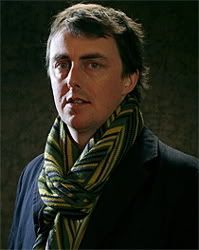 CS: I have to agree with you. I remember making movies of my own with my own video camera and this movie made me reflect on that and I still don’t have any solid reasons why I did it but I’m finding out that a lot of other people did that as well.
CS: I have to agree with you. I remember making movies of my own with my own video camera and this movie made me reflect on that and I still don’t have any solid reasons why I did it but I’m finding out that a lot of other people did that as well.
JENNINGS: Yes, when we were making this film 8 years ago we were laughing that so many people we knew made these things – kids live in an imaginary world and that’s not a cliché it’s really how it is. It’s only when you get older you think that’s not a good thing anymore and you start to lose that but it’s a lovely period of time in your life.
CS: I don’t think it’s bound by any time or space or anything like that.
JENNINGS: That’s certainly what we were trying to avoid.
CS: It’ s really timeless, almost kind of perfunctory, to think that RAMBOW would only exist in that time but if you looked at it in any time I think it would fit just as well. Additionally, as I watched seeing the effects on the screen, obviously this film has a lower budget, but the cinematography, the photography of the film it looked like you really wanted to capture details. It seemed the physical details were important to capture.
JENNINGS: The detail was just how I remember doing things as well. Whether I was doing the drawings in my books or just the things you notice in films. We never saw the bigger picture – at that age I never knew what the Viet Nam War was and that Rambow was being rejected and bullied by other people. I did like the way he sawed off his own arm. He’s not even crying – it’s unbelievable. Those are the little things we pick up on, aren’t they? Sometimes we obsess about the details and then it irritates everybody. It’s more about quirky detail than about character and stuff. Hopefully the detail cover the characters and doesn’t become too overbearing. Nostalgia too. People think we have gone out of our way to wake up quirky nostalgia but actually we had no intention of doing that. It was only as things started to come to set with hairstyles ducked and it was like, oh my god, this is getting ridiculous.CS: Certainly within the subplot, the French foreign exchange students. Was that intended to be so absurdly funny?
JENNINGS: Well, the thing was, I remember…have you had the French or European Foreign Exchange Program?
CS: Yes.
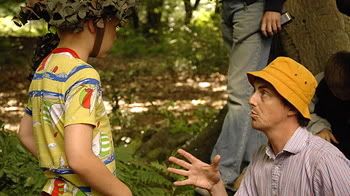 JENNINGS: We had the French exchange. And I’m sure if I were to go back in time it wasn’t the way I remember it but I remember these kids getting off their coach and the seemed so exhausted compared to us and so much cooler and so European. And then they had mustaches and we thought that was really cool because I was the latest developer in the history of time. We tried to make it so that anyone watching this film would understand that feeling. Obviously in order to get that we played around with it and he becomes a peacock – a Pied Piper and everyone can relate to the kid that people follow or are awestruck by even though you look back and say that guy was kind of a jerk – what was I thinking? It sorta came out and tried also to capture that when you look back you often realized that things weren’t so straight forward, like I said about RAMBOW. I remember the kids we thought were cool were invariably, they were but also more to it than that. There was always more to it. We were trying to get that across in the film. There was another side to it.
JENNINGS: We had the French exchange. And I’m sure if I were to go back in time it wasn’t the way I remember it but I remember these kids getting off their coach and the seemed so exhausted compared to us and so much cooler and so European. And then they had mustaches and we thought that was really cool because I was the latest developer in the history of time. We tried to make it so that anyone watching this film would understand that feeling. Obviously in order to get that we played around with it and he becomes a peacock – a Pied Piper and everyone can relate to the kid that people follow or are awestruck by even though you look back and say that guy was kind of a jerk – what was I thinking? It sorta came out and tried also to capture that when you look back you often realized that things weren’t so straight forward, like I said about RAMBOW. I remember the kids we thought were cool were invariably, they were but also more to it than that. There was always more to it. We were trying to get that across in the film. There was another side to it.
CS: On that, I think the brother issues, the mother issues…It ties things down on a more serious level. I’m curious as to why when you were creating the script, obviously first and foremost, you wanted to create this love of imagination in youth but on the other hand you have something that is quite heavy.
JENNINGS: Yeah. I just wanted to make a proper movie and a lot of movies miss that mark for me. I just like to feel the whole range, especially when you are a kid you feel things more passionately, your friendships, your great disappointments when things go wrong, we wanted to just push those buttons but without pushing people away. When you are telling a story you are kind of manipulating people but do it in a way that doesn’t shut them off and make them uncomfortable.
CS: Right. The budget for the film obviously was not on par with HITCHHIKER’S GUIDE TO THE GALAXY.
JENNINGS: No. 6 million dollars was SON OF RAMBOW and HITCHHIKER’S was $60.
CS: I would imagine that that would absolutely have played in your favor. That the film, itself, is an homage that time in their life. It should be a little rougher around the edges.
JENNINGS: And it’s not that we asked for more money. We budgeted SON OF RAMBOW at that figure. That’s how much we needed to make the film.
CS: Really?
JENNINGS: We’re not really in it to overwhelm ourselves with money and opulence. We like to explain our positions up front and work out the movie before we arrive on the set, very carefully, so that we’re compared and know what we are going for. Because it is very expensive and it is somebody else’s money and it is a lot of time and effort and it’s very important to us to know what we want and that seems to be …. I don’t care what the budget is as long as we can do it right. I didn’t find a difference really – there is no great difference between music videos and films in some ways because you always try to get what you want in the short space of time that you have and someone always hurt their foot, it’s always raining when you want it to be sunny, there’s always something to be worked out and it doesn’t matter if you’ve got hundreds of monitors and tons of catering – the problems are always the same.
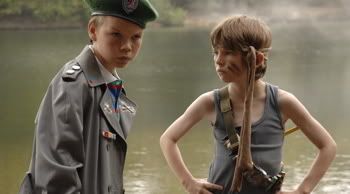 CS: Right. And on the subject of the script, at least in previous interviews I’ve read about you talking about fundamental influences coming in where Bill and Will are, do you think things are different today with the speed and access in which kids now are able to be exposed to so many different messages?
CS: Right. And on the subject of the script, at least in previous interviews I’ve read about you talking about fundamental influences coming in where Bill and Will are, do you think things are different today with the speed and access in which kids now are able to be exposed to so many different messages?
JENNINGS: I suppose there must be a bit. But to be honest with you I’m not really sure. I think you get to see more stuff I suppose than we would have done because of the access but most of the kids I’ve spoken to in the last few weeks, certainly when we were screening the movie, kids 8 years old up – they get it. They still feel the same way about things – they still get excited. If something’s good they’ll respond to it. But I don’t really know – I’ve got two of my own and they are very young and haven’t got to that age where they notice all this stuff but I’ve very curious to find out how different it will really be. But everyone thinks their youth was the best, don’t they? We got it right.
(Laughs)
CS: Exactly. Do you think – maybe even for yourself or the way you wanted Will and Bill to ultimately come out of the film – do you think at the end of this film it’s at that point where the kids are able to reflect on what they’ve done or do you think they still retain that sort of childish sensibility?
JENNINGS: In terms of the film? Or the boys themselves?
CS: No, I was thinking the story itself. It ends perfectly.
JENNINGS: I like those films where you get the sense that it might be alright, things might work out. It like at the end where they’re in the apartment sitting there. It’s not been resolved, not sure where they are going, but you’ve got a good – you like these people they might be better for having gone through the experience. Does that make sense?
CS: Yes, it does.
JENNINGS: I still feel that they worked out what was important. I think that’s their friendship. When they did things together, that was when he was the most fun. And they realized what was important at the end of the movie and I like the idea that it was a happy ending. I don’t think I could bear it if one of them had died or one of them didn’t like the other one.
(Laughs)
But it’s perfectly alright. When you are watching it you’re thinking – we’ve all had friendships like that at some point and probably around the same age as well. But then it gets dissolved and fades away – it’s not by any animosity by any means. You just grow up and you suddenly don’t like the same things – something happens. And it’s quite funny to look back and see how rich and how deep that friendship was and then everything changed. Not in a sad way but you can’t help but miss it.
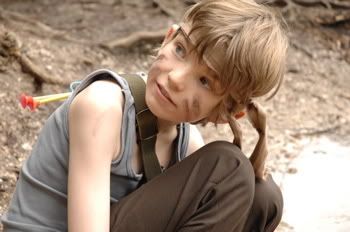 CS: I do. It’s what a lot of people who have seen it have reflected on saying, I remember having friendship like these and all of a sudden you’re in 8th grade, 9th grade and you just turn around and they are not there anymore and you don’t – no one is angry at one another – it just happens.
CS: I do. It’s what a lot of people who have seen it have reflected on saying, I remember having friendship like these and all of a sudden you’re in 8th grade, 9th grade and you just turn around and they are not there anymore and you don’t – no one is angry at one another – it just happens.
JENNINGS: Yeah, and I went through that and I think those two would have separated down the line, only because that was my experience. I can’t imagine it any other way – hopefully with very, very fond memories of each other. And those are the foundations of friendships to come I guess.
CS: I know we are short on time but I want to quickly talk about the animated sequence that comes in the middle of the film – the intricate, handmade drawings – How long did it take to make that sequence?
JENNINGS: Well, it’s a mixture of live action, isn’t it? It took about 3 hours to shoot the live action element just because of the blue screen and then I think David was drawing all by hand and then scanning the images into the manipulator in 3-D, I think he pretty much remarked, all in all, about 2 weeks work.
CS: Really?
JENNINGS: Yeah.
CS: It’s brilliant. It’s a sequence that fits perfectly within the realm of imagination while it doesn’t, again looking towards HITCHHIKER’S GUIDE, it doesn’t look like an effect that was too polished.
JENNINGS: The thing was that David O’Reilly was doing everything himself. I can’t help but thinking that the fewer people you empower the more focused they are and the more they get on with it. And I don’t mean that in the driving workforce way, purely, it’s just that that’s David’s sequence. It’s his baby in a way. So he puts all of himself into it rather than one guy, doing one scene….you know what I mean?
CS: Yes.
JENNINGS: And he would stay up all night. I would come in some mornings and he’d be waking up from having fallen asleep in his chair. And it’s not that we needed it done in a hurry it’s he loved it and worked very hard on it. It worked out great. I might be wrong, it might have taken a bit longer, it might have been a bit less. But once we got the money, which took forever, the shoot was 40 days and we had the picture 4 weeks after the wrap, which is fast, some films take months to edit, and gave it to David after that. He would give us a mock up of the animation within a few hours. We’d have a rough – we both worked out a rough storyboard together and he would do an animatic of that and I’d give it to the editor and wait for a while he was cutting while David was busy making trees.
CS: Does it seem that lower budget means more efficiency?
JENNINGS: Oh yeah. But it’s not just the budget thing. I think you could do a big movie – I’m always in favor of post count but you don’t know who you are getting. In every aspect of your film you have to cherry pick your crew. Every member. But once it gets to post production you’re told to go to a big company where they just have loads of people – but you don’t know these people and they are doing your things and suddenly it’s changed from one week to another into a different project. I used to find that very irritating. Because you can’t…..I just find it irritating.
(Laughs)
And then cherry picking skillful people and then giving it to them – it’s their thing – they are not just one of many people working on something that we could take or leave – it’s absolutely their responsibility – the more you make people responsible for it the more creative they are and the better the results I’m sure of it.
CS: Well, I know I have to wrap this up and if I could ask just one more question – I think a lot of times when directors make movies they say people can take whatever they want to take from it and give a short answer whenever pushed to explain what their work means but I’d like to hear what you hope people take away from the film.
JENNINGS: Well, Nick and I just wanted to make a film that captures how we felt at that age. It was like I was saying before that I just hope they enjoy it but more than that I hope they go away feeling better for having seen it. Like the old ones – get an uplifting feeling at the end – like they’ve really been through it and be rewarded at the end – it feels good and more of a feeling than I have no real message or anything like that. I don’t want people to come out and say oh the special effects were kinda quirky – that can come later. If they get a good feeling, I’ll be happy.
CS: Brilliant. Brilliant. Garth, thank you very much for your time.
JENNINGS: It’s my pleasure.
Comments: None
Leave a Reply |







